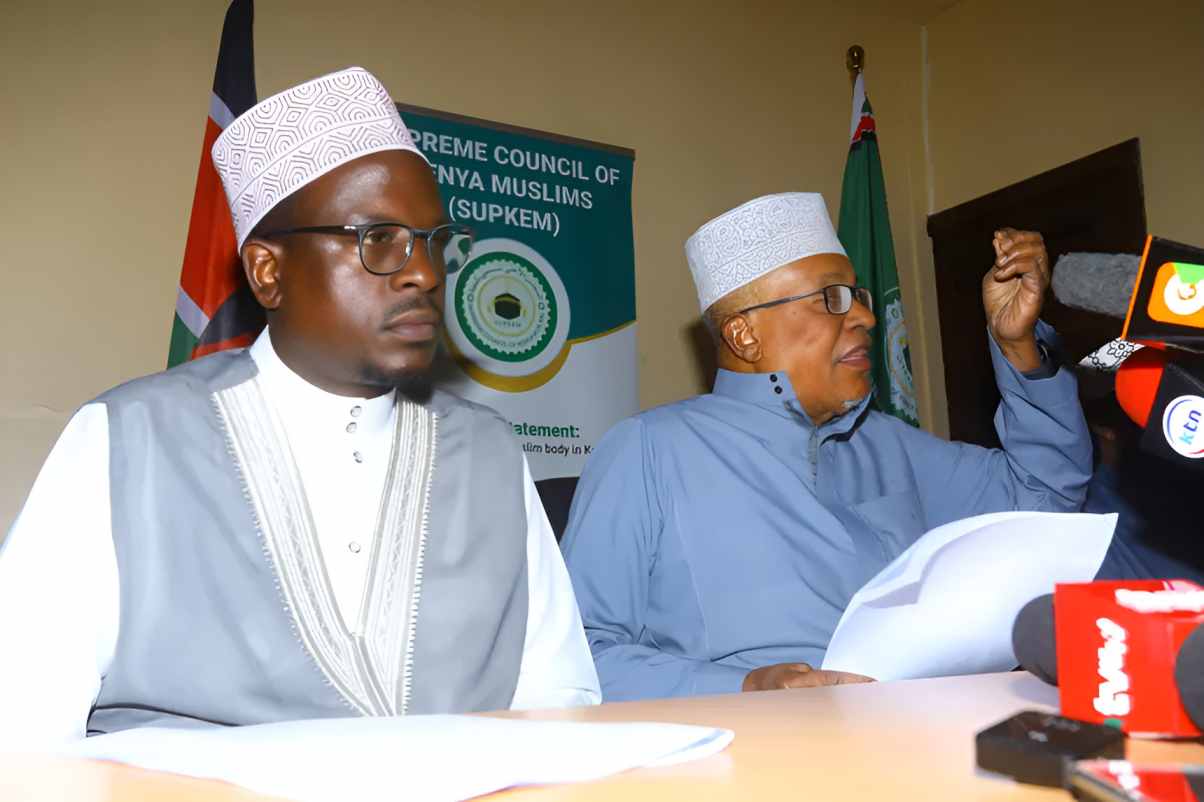The Supreme Council of Kenya Muslims (SUPKEM) is facing growing unrest as part of its membership demands fresh elections, accusing the current leadership of mismanagement, hand-picking of officials and failure to conduct polls since 2017.
The standoff has sparked protests outside the council’s headquarters in Nairobi, with members calling for the resignation of national chairperson Hassan ole Naado.
For nearly two weeks, demonstrators have gathered at the council’s offices, saying the organisation has been run as a one-man show for years. They argue that the leadership has not only delayed elections but also frustrated efforts to restore credibility.
According to the protesters, the last legitimate polls were held in 2017 under then chairperson Ambassador Abdulrahman Nzibo, who was ousted the following year in unclear circumstances. Ole Naado, initially serving in an interim capacity, went on to occupy the top seat permanently.
Former director general Lattif Ngirati Shaban, who was later sidelined, said the council’s constitution requires elections every three years but this was disrupted by the Covid-19 pandemic.
“We expected elections to be held in 2021, but this did not happen. We have not held an election since 2017, but, unfortunately, documents were processed and submitted to the Registrar of Societies, marking the beginning of a conspiracy at SUPKEM, because the names changed,” he said in an interview.
In January 2023, the Registrar of Societies removed Ole Naado and other officials from the registry for lack of elections, but they were reinstated through a court ruling, further fueling discontent.
“The National Executive Committee of SUPKEM does not elect itself. It is elected by delegates from the 47 counties. There have been fraudulent things happening, where supporters are being hand-picked as officials. They are being replaced without them knowing,” Ngirati added.
He also noted that in the 2017 contest, Ole Naado unsuccessfully vied for secretary general before later being appointed as an adviser to Nzibo.
Ngirati criticised the branding of protesters as “goons,” saying, “I want to apologise for the leadership of Muslims in this country. They are not goons. These are people agitating for what is right, a voice to be heard. It is wrong to call them goons.”
Abdulatif Juma Kombo, a former Laikipia branch treasurer, echoed the calls, insisting that elections are key to restoring the council’s credibility.
“My humble appeal to Hassan Ole Naado is that you should just resign to save the Muslim ummah from all that kind of shame. It is a shame for us to continue having children, Gen Zs, women and old people going to the street for protests just because of your leadership,” he said.
He further expressed concern about the handling of Muslim affairs, including the Hajj pilgrimage.
“We cannot continue having the Muslims complaining. They are making the Muslim community a laughing stock. SUPKEM is not personal property. This belongs to us as delegates at the grassroots. On their behalf, we demand sanity. We cannot continue like this,” he said.
Kombo also questioned his removal as a delegate, claiming he was replaced without his knowledge.
“When did they replace me? Why is the current national council hand-picking people from the grassroots to come and represent us? This is wrong. Let us have an interim leadership as we wait for a fresh election. Our house can only be in order if Hassan Ole Naado and his hand-picked executive council are dissolved,” he said.
Responding to the criticism, Ole Naado dismissed the demands, stating, “Their call for fresh elections does not matter. They are not members of the society and do not know how societies operate,” while maintaining that he is lawfully in office. He added that elections could take place within the next two years.
In a statement issued on September 11, 2025, the council attributed the protests to discomfort caused by ongoing reforms aimed at modernising SUPKEM. It defended its work, saying its mandate is to safeguard the welfare of the Muslim community while operating under a constitution that empowers it to support grassroots programmes.
The council listed its achievements in areas such as education, health, governance, Halal certification, Hajj, and emergency response in regions like North Eastern and northern Kenya. It also pointed to partnerships with the Islamic Development Bank that have supported the education of more than 380 doctors and engineers since 1981.
It added that the current leadership is working to amend the constitution, engage religious scholars, professionalise management through a secretariat and ensure transparency in the running of Hajj activities.

